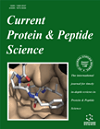-
s Immunoproteomics: The Key to Discovery of New Vaccine Antigens Against Bacterial Respiratory Infections
- Source: Current Protein and Peptide Science, Volume 13, Issue 8, Dec 2012, p. 807 - 815
-
- 01 Dec 2012
Abstract
The increase in antibiotic resistance and the shortage of new antimicrobials to prevent difficult bacterial infections underlines the importance of prophylactic therapies to prevent infection by bacterial pathogens. Vaccination has reduced the incidence of many serious diseases, including respiratory bacterial infections. However, there are many pathogens for which no vaccine is available and some vaccines are not effective among all age groups or among immunocompromised individuals. Immunoproteomics is a powerful technique which has been used to identify potential vaccine candidates to protect against pathogenic bacteria. The combination of proteomics with the detection of immunoreactive antigens using serum highlights immunogenic proteins that are expressed during infection. This is particularly useful when patient serum is used as the antigens that promote a humoral response during human infection are identified. This review outlines examples of vaccine candidates that have been identified using immunoproteomics and have successfully protected animals against challenge when tested in immunisation studies. Many immunoreactive proteins are common to several unrelated pathogens, however some of these are not always protective in animal immunisation and challenge studies. Furthermore, examples of well-established immunogens, including Bordetella pertussis antigen FHA were not detected in immunoproteomics studies, indicating that this technology may underrepresent the immunoreactive proteins in a pathogen. Although only one step in the pathway towards an efficacious approved vaccine, immunoproteomics is an important technology in the identification of novel vaccine antigens.


